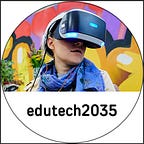University 20.35 Guide
In the near future millions of people will lose their jobs as a result of digital transformation. Big data, neurotechnologies, artificial intelligence and other breakthrough technologies will change the global labour market completely. Digital economy requires appropriately qualified personnel. And it is hard to imagine that traditional universities could prepare relevant educational programmes for people to work in digital economy. For this reason University 20.35 was established as the first digital university in Russia almost two years ago.
University 20.35 doesn’t have buildings, walls or desks. It doesn’t even have a chancellor, exams or degrees in contrast to other universities. It became the first university in Russia providing opportunities for professional development by creating individual educational trajectories and tracking digital skills profiles. It is aimed at training business leaders, entrepreneurs, managers, start-up technological designers, talented university and school students.
Unique features of University 20.35
University 20.35 offers its students unique educational opportunities and relevant digital skills:
1. Recommendations for personal education trajectories based on the results of the students’ current skill diagnostics, educational background and individual needs.
2. Combination of online and offline learning from world-class teachers with top level skills.
3. Community of the National Technology Initiative leaders and the possibility to study together.
4. Digital skills profile.
5. Recommendations on team development (considering each participant’s profile) for technological projects.
University has already launched pilot programmes at selected Russian universities offering students an opportunity to develop a set of competencies required for digital economy via personalized blended learning curves. Educational content providers, proffering unique learning experiences related to digital economy are encouraged to share their content at the platform of University 20.35.
“The opportunity to join the platform is not only among the top 10, but also among regional educational leaders who will be able to take elements from our experiment that are relevant for their situation,” Vasily Tretyakov, Director-General of University 20.35 says.
However, the most important event that happened in Russian education in 2018 was Island 10–21, a unique and innovative training course on digital economy organized by University 20.35.
Aunique Island for a unique University. What is Island 10–21?
Island 10–21 became the first educational project in Russia aimed at intensive skills development for the digital economy and the National Technology Initiative. The project provides skills development in the field of digital and cross-cutting technologies combined with skills of personal and team performance management.
The educational programme of the project Island 10–21 was held from 10 to 21, July 2018 on Russky Island (Vladivostok) and was based at the Far Eastern Federal University campus. More than 1000 people from all over the country (technological entrepreneurs, data analysts, engineers, university students, talented school students, regional and federal officials) took part in Island 10–21. World-class educators and the most renown practitioners became tutors and mentors of the participants.
30,000 applicants showed interest in the programme
8000 completed the diagnostics
1021 applicants were chosen to participate in the Island
980 participants graduated from the intensive educational program
What happened on Island 10–21 for the first time?
- We have collected a ‘digital footprint’ during educational processes which confirms students’ skills. It also confirms a trajectory module tutor is able to transfer skills to students efficiently. The ‘digital footprint’ covers all courses the student attended, all products and artifacts made during the programme including projects, ideas, schemes, documents, roadmaps, program codes, 3D printed objects.
2. Artificial intelligence technologies were used at the selection stage. For the first time in the world artificial intelligence without any additional human action has decided on students to be accepted for the programme.
3. Personal learning trajectories were based on artificial intelligence recommendations. The recommendations included a list of skills and knowledge that are necessary for professional activity, a selection of events and educational tracks that would ensure students’ development.
4. Students were involved in educational activities for 14 hours every day within 11 days with no weekends. No one before had ever organized educational courses lasting 14 hours per day for more than 4 days.
5. Biological feedback was included in the digital footprint. Students had to wear special biometric sensors that recorded their heart rate. Afterwards heart rate changes were analyzed comparing with activities the student was involved into.
Within 11 days we have collected a significant amount of data equal to 11 years of life for one person.
In July, 2019 University 20.35 held the second educational programme Island 10–22. It took place in Skolkovo Institute of Science and Technology, Moscow and was aimed at university chancellors, academic staff and people involved or interested in the evolution of education system in Russia.
1000 people participated including regional universities’ teams that consisted of venture capital funds’ representatives, regional authorities and businessmen.
500 leaders of changes in education system and education start-up teams.
Digital transformation for government officials
Today Russian education system needs not only people who know how to teach in the era of digital economy but those who can manage education organizations and all relevant processes especially in the regions. For this reason University 20.35 organized a special course for regional authorities, Chief data officers (CDO, Data management). CDO tends to be one of University 20.35 priorities and one of the main educational tracks on Island 10–22. It is aimed at regional authorities and provide them with digital skills especially big data and applies them in the area of education.
CDO program was tested last summer during Island 10–21. Representatives of regional authorities who participated in the program worked on projects concerning management in education, healthcare, tourism and social sector which were finally implemented in most regions. For example, the team from Orenburg region in conjunction with one of the largest telecom operators in Russia Megafon started to implement in the region a project on digital analysis of tourist flow. The team from Chelyabinsk presented a platform for technological services that enables local entrepreneurs to work in cooperation with the best university labs.
